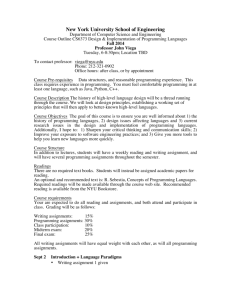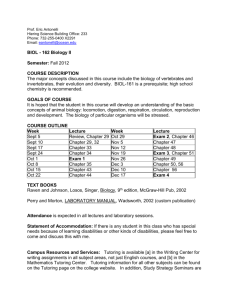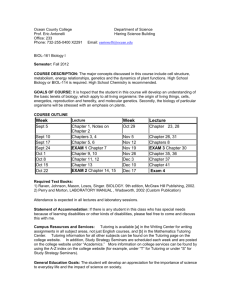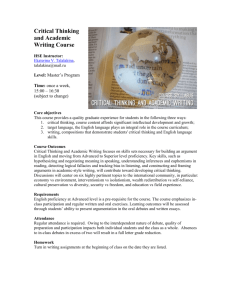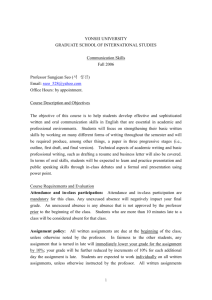Principles of Biology II - Writing Across the Curriculum
advertisement
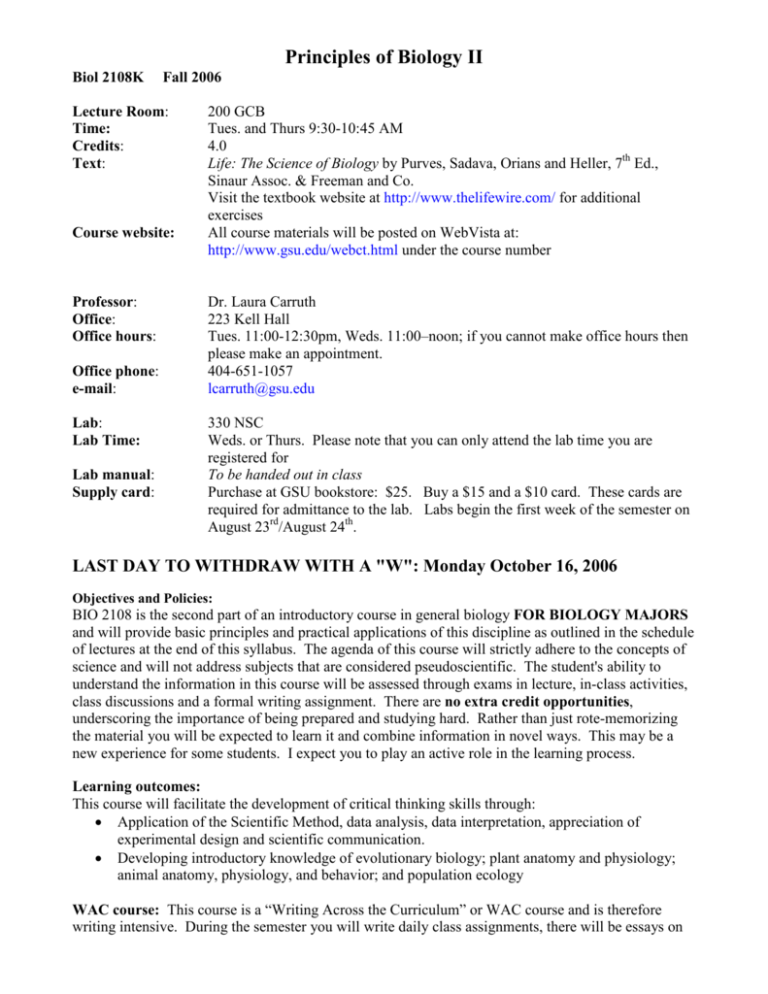
Principles of Biology II Biol 2108K Fall 2006 Lecture Room: Time: Credits: Text: Course website: Professor: Office: Office hours: Office phone: e-mail: Lab: Lab Time: Lab manual: Supply card: 200 GCB Tues. and Thurs 9:30-10:45 AM 4.0 Life: The Science of Biology by Purves, Sadava, Orians and Heller, 7th Ed., Sinaur Assoc. & Freeman and Co. Visit the textbook website at http://www.thelifewire.com/ for additional exercises All course materials will be posted on WebVista at: http://www.gsu.edu/webct.html under the course number Dr. Laura Carruth 223 Kell Hall Tues. 11:00-12:30pm, Weds. 11:00–noon; if you cannot make office hours then please make an appointment. 404-651-1057 lcarruth@gsu.edu 330 NSC Weds. or Thurs. Please note that you can only attend the lab time you are registered for To be handed out in class Purchase at GSU bookstore: $25. Buy a $15 and a $10 card. These cards are required for admittance to the lab. Labs begin the first week of the semester on August 23rd/August 24th. LAST DAY TO WITHDRAW WITH A "W": Monday October 16, 2006 Objectives and Policies: BIO 2108 is the second part of an introductory course in general biology FOR BIOLOGY MAJORS and will provide basic principles and practical applications of this discipline as outlined in the schedule of lectures at the end of this syllabus. The agenda of this course will strictly adhere to the concepts of science and will not address subjects that are considered pseudoscientific. The student's ability to understand the information in this course will be assessed through exams in lecture, in-class activities, class discussions and a formal writing assignment. There are no extra credit opportunities, underscoring the importance of being prepared and studying hard. Rather than just rote-memorizing the material you will be expected to learn it and combine information in novel ways. This may be a new experience for some students. I expect you to play an active role in the learning process. Learning outcomes: This course will facilitate the development of critical thinking skills through: • Application of the Scientific Method, data analysis, data interpretation, appreciation of experimental design and scientific communication. • Developing introductory knowledge of evolutionary biology; plant anatomy and physiology; animal anatomy, physiology, and behavior; and population ecology WAC course: This course is a “Writing Across the Curriculum” or WAC course and is therefore writing intensive. During the semester you will write daily class assignments, there will be essays on every exam, and you will have a lecture paper. Some of your assignments will be submitted using the WAC website at http://wac.gsu.edu/wow/. The writing consultant for this class is Ms. Kelli Duncan. The policies and rules for this course are as follows: Attendance: You will not do well in this course if you do not attend lecture. Everyday you will complete a short in-class writing assignment which will be collected and graded with a check, checkplus, or check-minus daily. You will need to complete 25/28 of these in order to get 25 participation points for class (in-class writing assignments below). Four of these assignments will be submitted using the WAC website above. If you have a valid reason to be absent (eg. religious holiday, sports participation, illness) please let me know in advance if possible. In addition, material presented in lecture may not always be in the textbook. Laboratory attendance is mandatory. If a student misses a lecture session, then it is the responsibility of the student to obtain notes, assignments, and any materials handed out in class. Poor attendance correlates strongly with lower grades. This class is the foundation for your other Biology Classes at GSU and you should use this opportunity to prepare your self as thoroughly as possible for your upper division courses. Prerequisites: Biol 2107K (or Biol 1107K and 2800) and Chem 1211. If you have not had these prerequisites you may not take this class. Being late for lecture or lab: It is very disruptive to both the instructor and other students when you are late to class. Please be respectful and be on time. Reading: It is expected that students will have read the assigned chapters of the textbook PRIOR to coming to class or lab. This will help you to appreciate the material being presented. Do not wait to do the reading to the night before an exam, you will not do very well with that type of studying. Tests and quizzes: Make-up exams are given only for excused absences, which must be documented and are at the instructor's discretion. The make-up exam will consist of essay and oral exam questions that are considered to be harder than the principle exam. NO MORE THAN ONE MAKE-UP EXAM WILL BE GIVEN TO ANY STUDENT DURING THE SEMESTER. Labs: Every lab session is mandatory. There are no make-up labs! Your lab grade is determined by your lab TA and then given to me to be included as 25% of your final course grade. Grading: Your grade will be determined by the results of 3 lecture exams (two midterms and a final exam, 125 points each), 4 in-class activities (12.5 points each), 1 paper for lecture (75 points), 25 inclass writing assignment points, and lab points (see lab syllabus). All exams will be administered in GCB 200. Cheating will not be tolerated and a grade of 0.0 will be submitted for anyone caught doing so. Points Breakdown: Assignment Point value Percent of final grade Exam I: 125 18% Exam II: 125 18% Final Exam: 125 18% In-Class Activities (12.5 points each) 50 7% Lecture Paper: 75 11% Lecture in-class writing assignments 25 3% Lab quizzes and write ups: 175 25% (Lab total is 235 and is 25% of total grade) Total Points Possible: 700 points Assignment of Final Letter Grades: The Department of Biology does not award plus or minus grades. Your grade will be determined using the following scale: Grade Points Percent Scale A 630 and above 90-100% B 560-629 80-89% C 490-559 70-79% D 420-489 60-69% F 419 and below 59% and below NOTE: Proper conduct in class and lab is an assignment. If you choose to engage in conduct that is disruptive to other students or the instructor, you will automatically forfeit 10% of your grade for every infraction. This rule will be enforced at the instructor's discretion. The following actions will result in automatic application of this rule: talking in class for any length of time, improper disruptions from irrelevant questions, answering calls on your cell phone. If I need to stop class for any of these reasons, you will have your grade reduced by 10% immediately. University policy on academic honesty: Please read the GSU Student Code of conduct and Polices at http://www2.gsu.edu/~wwwdos/codeofconduct_conpol.html#4. All members of the university are responsible for abiding by its tenets. Lack of knowledge of this policy is NOT an acceptable defense to any charge of academic dishonesty. All members of the academic community are expected to report violations of these standards of academic conduct to the appropriate authorities. Copying from other students or plagiarizing information on assignments are violations of the GSU policy on academic honesty. Letters of recommendation: If the program you wish to apply for requires a letter from your instructors, then it is worth thinking about what I would write in a letter about you well before you ask me for one. If you exhibit improper conduct, never participate in class, have poor attendance, or remain invisible to me with the exception of your test scores, then I cannot write a letter for you. Letters of recommendation are written for students of outstanding ability and involvement, or students with average or above average grades that demonstrate hard work and dedication to learning. Need Help? If you experience any academic difficulties, please contact the Counseling Center (404651-2211). The education counselors can assist with time management, reading note taking, and test preparation skills. Students with special needs should also contact the GSU Counseling Center at www.gsu.edu/~wwwcou or go to 106 Courtland Street (404-651-2211) and notify Dr. Carruth at the beginning of the semester. If you are having a problem with the course material please ASK FOR HELP EARLY! I cannot help you unless I know you need help and once the semester is over it is too late. Turn off your cell phone and pager when you enter class. If your cell phone rings I WILL answer it. All cell phones must be packed in your bag/put away during exams. Failure to do so will result in your phone being confiscated until the exam is over. Tentative schedule of lectures ** The schedule and assignments are subject to change at the professor’s discretion** Lab W or TH Lab Topic 22, 23 8/23 or 8/24 Introduction, Bring Breakage Cards 8/30 or 8/31 Termite Lab 9/6 or 9/7 Microbiology A, B and C 9/20 or 9/19 Microbiology D 9/20 or 9/21 Plant hormones I 9/27 or 9/28 Plant hormones II 10/4 or 10/5 Lab midterm 10/11 or 10/12 Animal Behavior and Comparative Anatomy 10/18 or 10/19 Plant presentations 10/25 or 10/26 Senses Lecture 1 TH Aug. 24 2 T Aug. 29 3 Speciation, Phylogenetics 24, 25 TH Aug. 31 4 Molecular evolution 26 T Sept. 5 5 Bacteria Protists In-Class Activity I 27 28 TH Sept. 7 6 Fungi 31 T Sept. 12 7 29, 30 TH Sept. 14 8 T Sept. 19 9 TH Sept. 21 10 Plant Evolution (plants without and with seeds Plant Anatomy In-Class activity II Transport in Plants Plant hormones Exam I T Sept. 26 11 39 TH Sept. 28 12 T Oct. 3 13 TH Oct. 5 T Oct. 10 TH Oct. 12 14 15 16 Reproduction in flowering plants Plant nutrition Plant Responses Animal Origins and Body Plans Ecdysozoans Deuterostomes Using the GSU library Skye Hardesty, GSU Science Librarian M, Oct. 16 T Oct. 17 17 TH Oct. 19 18 T Oct. 24 19 TH Oct. 26 20 Lecture Topic Introduction, Scientific Method History of Life on Earth, Mechanisms of evolution Text Chapters 1 Date T Aug. 22 35 36 38 37, 40 32 33 34 40 Last day to withdraw and possibly receive a “W” Homeostasis 41 Animal Development In-Class Activity III Animal Hormones Lecture Paper draft due (optional) Animal Reproduction 20 42 43 T Oct. 31 TH Nov. 2 21 22 T Nov. 7 TH Nov. 9 23 24 T Nov. 14 25 Muscle Physiology 47 TH Nov. 16 26 48 Nov. 21-24 T Nov. 28 TH Nov. 30 27 28 Gas exchange and respiratory systems Lecture Paper due in class (no late papers accepted) Thanksgiving Holiday Circulatory Systems Excretory system T Dec. 5 29 52, 53 TH Dec. 7 30 Animal behavior and behavioral ecology Population Ecology Review for final *Final Exam at 8:00am* 200 GCB TH Dec. 14 Exam II Neurons and Nervous Systems Sensory Systems Central Nervous System In-Class Activity IV 44 11/1 or 11/2 Circulatory system I 45 46 11/8 or 11/9 Circulatory system II, Muscles 11/15 or 11/16 Review for lab final exam 11/29 or 11/30 Lab final exam 49 51 54



